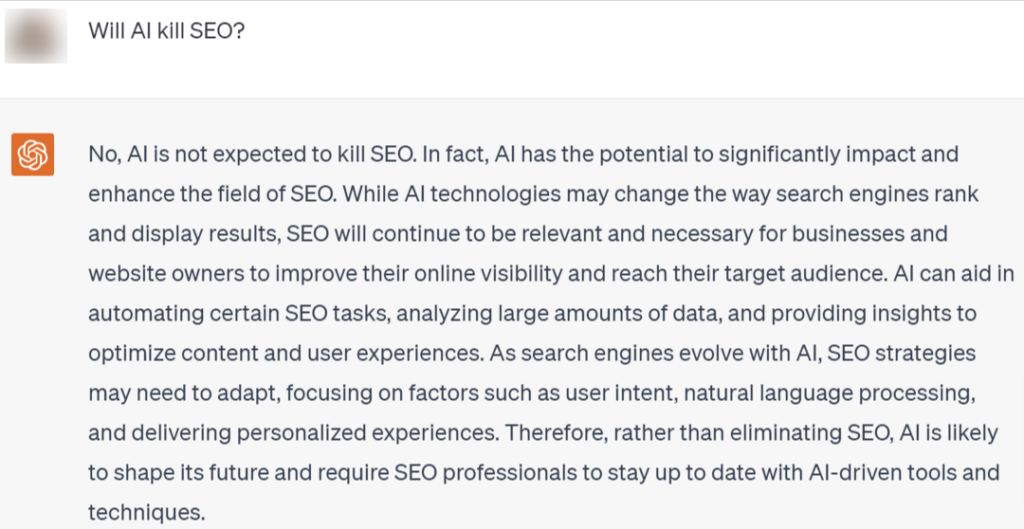Stephen Hawkings once said, “Success in creating AI would be the biggest event in human history. Unfortunately, it might also be the last, unless we learn how to avoid the risks.”
Well, he couldn’t be any more loud. The year 2023 can be called one of the biggest marks in the history of technology because of ChatGPT. Initially released in November 2022, ChatGPT got its first stable version on May 24, 2023.
We all had been touched by AI at some level until ChatGPT’s release, but with this magical tool, AI went from being our occasional visitor to an almost everyday coffee friend in the work environment.
Tech Giants' Leap into AI: Microsoft and Google's Moves
Right after ChatGPT’s public release, Microsoft made a strong move by announcing a $10 billion commitment to OpenAI, further solidifying their partnership on GPT, a powerful LLM that powers ChatGPT and now enhances the AI capabilities of Bing.
And in an effort to keep pace with Microsoft, Google made a substantial investment of over $400 million in Anthropic, a competitor to ChatGPT. Additionally, there are predictions that Google will allocate around $300 billion towards AI by 2028, which includes the development of its own chatbot named Bard.
Most people have been using these tools to write content for various purposes, but where does this go for SEO?
Interviewing AI

Navigating the AI Content Conundrum
-
AI Content Creation: From Quantity to Quality
ChatGPT or generative AI in general, is expected to make a lot more SEO content every day, and we are not going to argue against it. The creation of high-quality, contextually relevant content at scale, increases the content output for businesses. -
Pen to Processor
ChatGPT’s introduction into the content creation process accelerates the production of well-structured, grammatically correct, and SEO-friendly drafts. The downside is a potential homogenization of content. AI, though efficient, lacks the unique human touch and personal flair, essential in crafting content that resonates deeply with audiences. -
The SEO Landscape: Long-Tail Keywords and User Experience
The ability of AI to understand natural language queries is paving the way for a renewed focus on long-tail keywords in the world of SEO. This capability is forcing a significant shift in traditional SEO strategies, moving away from shorter, more generic keywords to longer, more specific phrases that capture user intent more accurately.
The time & skills that are required to research and write an article specifically for SEO has already gone down a lot. However, a surge in similar content could potentially result in saturation, with more content not necessarily equating to better visibility or higher rankings. The content will be produced in large numbers. But the ideas for these content or prompts are always going to be inspired/copied which will drastically increase the competition of search result pages.
While ChatGPT can create content based on input data, it doesn’t inherently understand the content it generates. Therefore, the possibility of misinterpretations or contextually incorrect content remains. The challenge lies in striking the right balance, marrying AI’s strengths with the irreplaceable creativity and intuition of human writers.
Adapting to this new landscape calls for an innovative approach, and businesses must recalibrate their SEO tactics to stay ahead of the game.
Transforming User Experiences
-
Bypassing Browsers
AI technologies such as ChatGPT are offering a fast and efficient alternative to traditional web browsing. With the ability to fetch and present data directly within the chat interface, these technologies bypass the need to visit actual websites, providing users with instant, concise answers to their queries. -
Voice Activation
ChatGPT’s improvement of voice assistant capabilities leads to increased voice search usage. This presents an opportunity for businesses to optimize content for voice search. -
Deciphering Desires
The advanced language understanding abilities of ChatGPT can interpret search intent more accurately, leading to more relevant search results and a better user experience.
As users increasingly interact with AI interfaces, website traffic, and user engagement—both critical components for SEO rankings—begin to dwindle. This decline, in turn, affects online visibility, potentially impacting advertising revenue and the overall reach of a website.
However, this shift towards voice-activated searches is not without its pitfalls. As these searches often result in zero-click results—providing answers directly in the search interface—they can further decrease the volume of traffic to websites.
However, this increased sophistication means SEO professionals and content creators must evolve their strategies to focus on fulfilling user intent rather than just integrating keywords, adding complexity to the already intricate field of SEO.
A Pandora's Box for SEO
-
The Black Hat Threats
-
All That Glitters is Not Gold
The potential misuse of AI could pave the way for large-scale production of spam content, subtle manipulation of backlinks, and other unscrupulous tactics. These black-hat practices have the potential to distort the SEO landscape, creating an uneven playing field that could harm honest businesses.
Businesses and SEO professionals must stay vigilant and aware of these potential threats. A delicate balance must be struck between leveraging AI’s capabilities and ensuring the integrity of the SEO landscape.
AI’s ability to quickly process and analyze large data sets is undeniably impressive, but it’s crucial to remember that it’s not infallible. Despite its sophistication, AI can sometimes falter, making errors in judgment or interpretation. An over-reliance on AI for SEO can thus lead to inaccuracies in analysis or the formulation of ineffective strategies.
This becomes particularly evident when dealing with ambiguous or context-sensitive content, where the nuanced understanding and emotional intelligence of a human may outperform logic-driven AI. It’s crucial to approach it with a critical eye and a balanced perspective, making the most of its strengths while also accounting for its limitations.
The Future of SEO: Adapting to AI Innovations
There’s no doubt that artificial intelligence, especially AI-powered tools like ChatGPT, is introducing new dynamics and challenges for SEO. These sophisticated technologies, indicative of the future of SEO with AI, offer a new paradigm in how we create and optimize content, understand user intent, and strategize for the digital landscape.
While we should certainly rejoice in the efficiency and possibilities these tools bring, we must not overlook the critical role that human creativity, intuition, and ethical considerations play in the digital ecosystem.
This new breed of AI doesn’t merely nudge the boundaries of SEO—it shatters them, casting the future of SEO into an abyss of unknowns. As we brace ourselves to navigate this unsettling new era, we are reminded that change, while inevitable, is rarely without its shadows.
FAQs
-
How is ChatGPT Changing SEO Strategies?
ChatGPT is revolutionizing SEO by enabling more efficient content creation, optimizing for long-tail keywords, and improving understanding of user intent.
-
Can AI Like ChatGPT Replace Human SEO Experts?
While AI can enhance SEO processes, it cannot replace the unique creativity and strategic thinking of human SEO experts. It’s more of a tool to augment human skills.
-
What Are the Ethical Considerations of Using AI in SEO?
Ethical considerations include ensuring content authenticity, avoiding manipulative tactics, and maintaining transparency in AI-generated content.
-
How Will the Future of SEO Look With the Integration of AI?
The future of SEO with AI integration looks promising, with more personalized content, improved user experience, and innovative strategies that blend AI efficiency with human insight.



